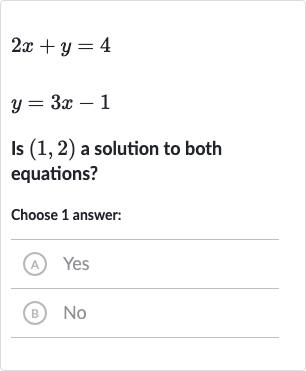Full solution
Q. Is a solution to both equations?Choose answer:(A) Yes(B) No
- Substitute and Check First Equation: First, we will substitute the point into the first equation and check if it holds true. The first equation is . If we substitute and , we get .
- Verify First Equation: After performing the calculation, we find that , which is true. Therefore, the point satisfies the first equation.
- Substitute and Check Second Equation: Next, we will substitute the point into the second equation and check if it holds true. The second equation is . If we substitute and , we get .
- Verify Second Equation: After performing the calculation, we find that , which is also true. Therefore, the point satisfies the second equation as well.
- Solution to the System of Equations: Since the point satisfies both equations, it is a solution to the system of equations.
More problems from Is (x, y) a solution to the system of equations?
QuestionGet tutor help
QuestionGet tutor help

